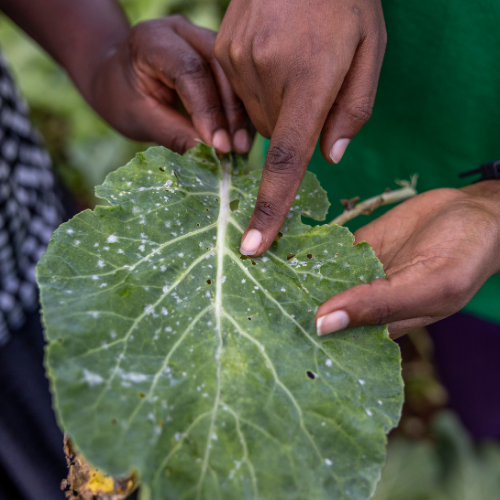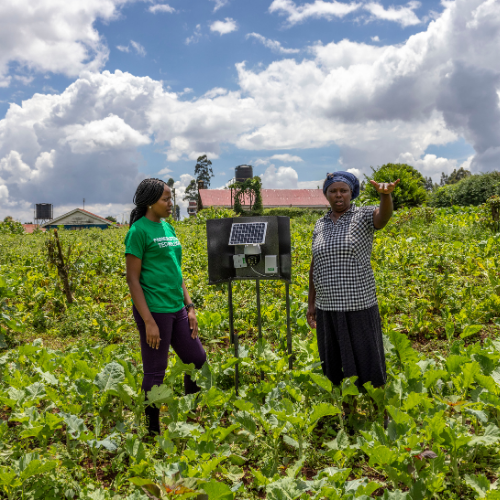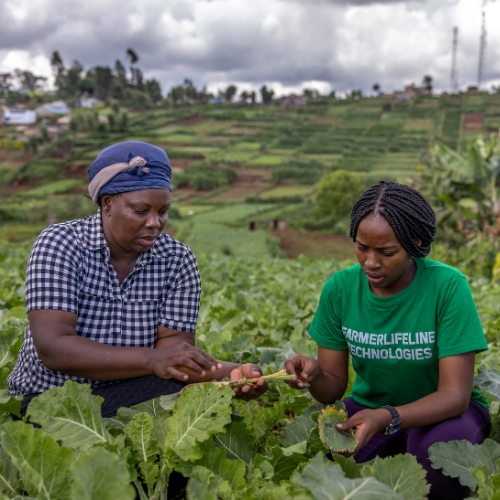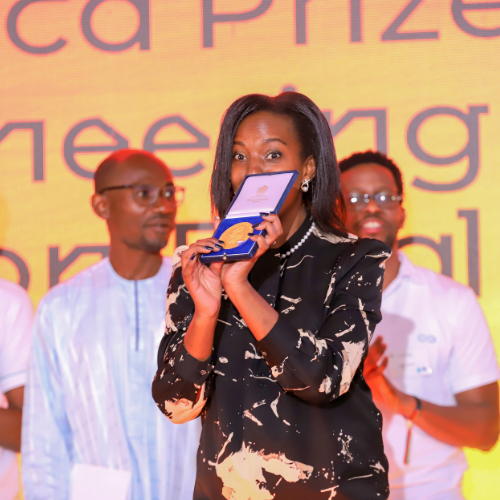Esther's innovation—the Early Crop Pest and Disease Detection Device—is changing the reality of smallholder farming across Africa. With a solar-powered tool equipped with artificial intelligence and machine learning, Esther is helping farmers detect and identify pests and diseases quickly, enabling early action to save crops. Esther sat down with us to tell us more about her journey to agri-technology and how making it to the shortlist of the Africa Prize, and eventually winning it, helped open doors.

From agriculture to agri-technology
Esther grew up in Nyandarua county, a farming community in Kenya where agriculture was the primary livelihood. She watched her parents lose up to 40% of their crops each season to pests and diseases, severely impacting her family's income and quality of life. "It was devastating to see the effects of these challenges on our community," she recalls. Esther would help out with farming tasks while completing her high school education, and though her parents needed the extra support, they encouraged her to study. Unlike many of her peers who never got the opportunity, Esther was fortunate enough to attend university—the only girl from her village to do so. “I felt a responsibility to leave home to change home,” she says. This sense of purpose is still driving her.
Her parents saw great potential in her from an early age and supported her to pursue a degree in computer science, a field she loved. “I owe a lot to my parents for believing in me,” she reflects. She found herself one of the few women in a male-dominated programme, but she embraced the challenge.

“I quickly realised that technology could solve real-world problems,” she explains. “At university, I learned about machine learning. It wasn’t in the context of agriculture, but I saw how it could translate into practical solutions for farmers.”
When she graduated in 2019, Esther faced a tough job market, with few hiring opportunities and many layoffs. But instead of feeling defeated, she saw an opportunity. “I felt that the agri-tech space was empty—no one was doing what I wanted to do,” she says. “I knew it would be risky. I had no capital, no team, and no guarantee of success. But I also knew that the potential impact of my work was worth the risk.”
Determined to make a difference, Esther founded Farmer Lifeline Technologies in 2020, with a mission to empower smallholder farmers—many of whom are women—to increase their income and reduce crop losses. Her Early Crop Pest and Disease Detection Device was born from this vision. “Entrepreneurship isn’t something you plan; it’s something you do when you see a need,” Esther shares.

Tailored mentoring set the Africa Prize programme apart
Esther knew she needed some external input to take her company to the next step. “The Africa Prize offered expert support, individualised mentorship, and tailored business advice—resources that are otherwise very expensive for a startup,” she says. “It was an opportunity we couldn’t let go.” She credits the Africa Prize programme with providing her with invaluable mentorship, from learning how to protect her innovation from imitation to strategising how to produce her devices at a lower cost. “My product mentor, Toby, was with us from the start, guiding us through every challenge. His background in agricultural engineering resonated deeply with our goals,” Esther reflects.
Through the Africa Prize programme, Esther also joined a community of like-minded entrepreneurs who are using engineering to solve local problems creatively. “I was so inspired by what young people are doing across the continent—turning waste into valuable products, improving food traceability, and more,” she shares. “Engineering should not be seen as a big, intimidating word. It’s simply about finding solutions to problems in creative ways.”

Esther’s journey with the Africa Prize has not only brought her innovation to life but has also expanded her vision. She aims to empower one million smallholder farmers by 2030, helping them reduce losses and increase yields. “At the core of Farmer Lifeline Technology is the ‘why’ and the ‘who’,” she reflects. “My greatest inspiration is the farming community I grew up with. To get the opportunity to empower them gives me a reason to get up every day and do what I do.”
To aspiring innovators, Esther offers a word of advice: “Take the application seriously and make sure you align with the eligibility criteria. Dedicate time and effort to the programme—it pays off. When you give it your best, it gives back in the best ways.”
